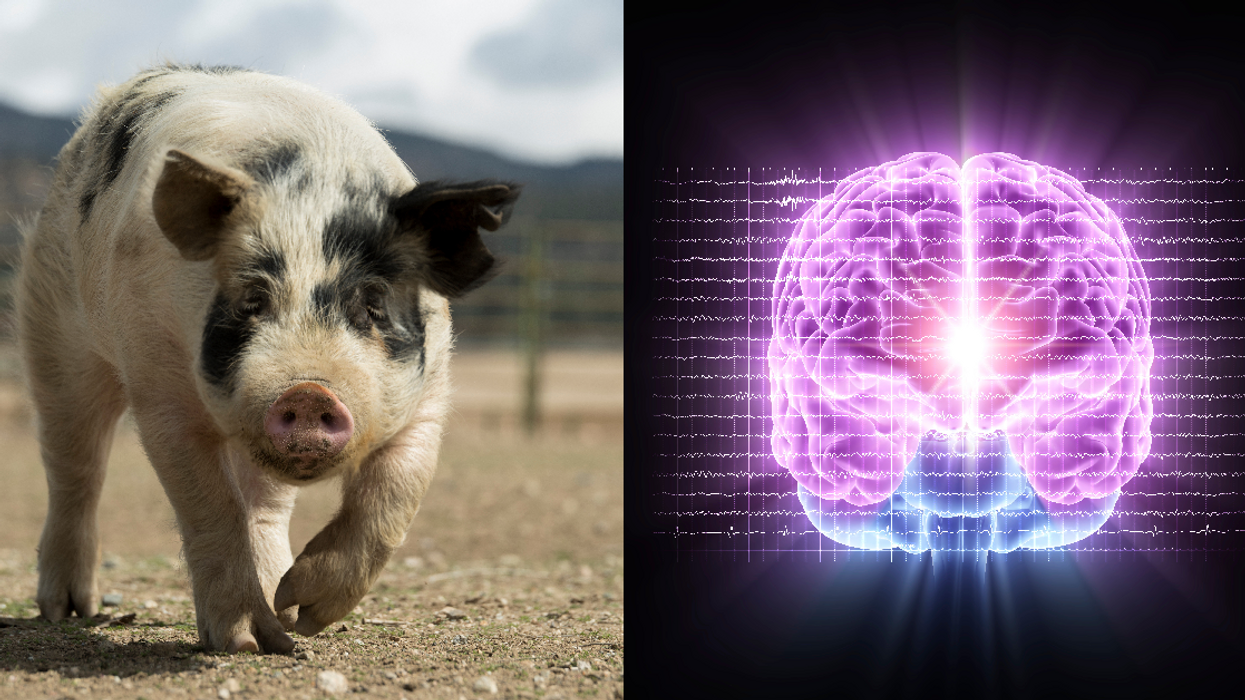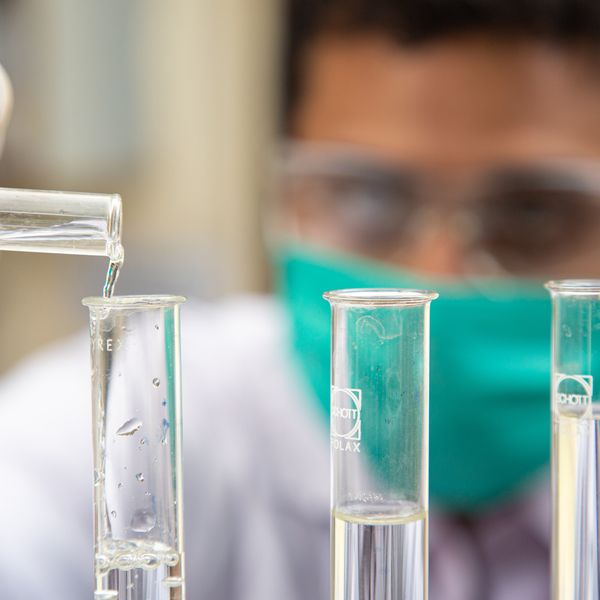Scientists Have Restored A Surprising Amount Of Function In The Brain Of A Pig Hours After It Was Killed In A Slaughterhouse

A research team from Yale University has managed to restore some brain function in the brains of pigs who were killed hours prior.
The team announced their success in a recent paper published in the journal Nature.
Scientists placed the brains of pigs from a nearby slaughterhouse in a solution of chemicals meant to preserve and repair the brain's cells. The solution also contained a medication to prevent the brain from regaining any type of conscious thought.
When scientists tested the brains after 6 hours in the preservation solution, they discovered that they were observably less deteriorated than the brains which were left exposed to air.
Nenad Sestan, of Yale University's School of Medicine, told NPR:
"We found that tissue and cellular structure is preserved and cell death is reduced. In addition, some molecular and cellular functions were restored."
"This is not a living brain, but it is a cellularly active brain."
That emphasis on it not being a living brain is important. Given the ethical concerns such an experiment brings up, the team were extremely careful to make sure that no true consciousness could be restored to the brains.
We have known that some viable cells remain in the brain several hours after it is deprived of oxygen, as scientists have been able to study them this way in the past.
Sesta highlighted the problem with this method of study, though:
"...the problem is, once you do that, you are losing the 3D organization of the brain."
In order to improve how we study the brain, Sesta and colleagues wondered if there wasn't a way to do so while still leaving the cells in a whole, intact brain.
Stephen Latham, a bioethicist that worked closely with the research group, said:
"It was something that the researchers were actively worried about."
Thus, the experiment involved chemicals to ensure that the brain could not regain any sort of consciousness. A medication called lamotrigine, which is used to treat seizures and is known to suppress neuronal activity, was included in the solution that the brains were soaked in.
Latham told NPR that this was also because:
"the researchers thought that brain cells might be better preserved and their function might be better restored if they were not active."
Duke Law School Ethicist Nita Farahany, who focuses on the ethics of emerging technology, said of the experiment:
"It was mind-blowing."
"My initial reaction was pretty shocked. It's a groundbreaking discovery, but it also really fundamentally changes a lot of what the existing beliefs are in neuroscience about the irreversible loss of brain function once there is deprivation of oxygen to the brain."
Khara Ramos, who is the director of neuroethics at the National Institute of Disorders and Stroke, also talked about the importance of continuing to move forward on these experiments in an ethical manner.
"The science is so new that we all need to work together to think proactively about its ethical implications so that we can responsibly shape how this science moves forward."
Farahany and her colleagues Charles Giattino and Henry Greely also published a commentary in Nature alongside their paper. In it, they cite a line from the character Miracle Max in the film The Princess Bride:
"There's a big difference between mostly dead and all dead. Mostly dead is slightly alive."
It seemed many people had the same reaction to the news on Facebook: zombie pigs.


One neuroscientist also tried to address the concerns of those who jumped to the zombie conclusion.

Over on Twitter, people were also concerned with the possible ethical implications, but noted that the team had done a good job addressing them.
@NPR I’m amazed about the cellular solution that was created to take the place of blood for this experiment. Huge e… https://t.co/ztgldQWsU5— Vanessa (@Vanessa) 1555576979.0
This experiment definitely raises some tangled ethical questions, but the researchers are determined to move forward in an ethical manner.
The scientific ethics community is considering how this can be done, and the implications of the findings on the broader reality of experimentation on dead organs.
People Reveal The Weirdest Thing About Themselves
Reddit user Isitjustmedownhere asked: 'Give an example; how weird are you really?'

Let's get one thing straight: no one is normal. We're all weird in our own ways, and that is actually normal.
Of course, that doesn't mean we don't all have that one strange trait or quirk that outweighs all the other weirdness we possess.
For me, it's the fact that I'm almost 30 years old, and I still have an imaginary friend. Her name is Sarah, she has red hair and green eyes, and I strongly believe that, since I lived in India when I created her and there were no actual people with red hair around, she was based on Daphne Blake from Scooby-Doo.
I also didn't know the name Sarah when I created her, so that came later. I know she's not really there, hence the term 'imaginary friend,' but she's kind of always been around. We all have conversations in our heads; mine are with Sarah. She keeps me on task and efficient.
My mom thinks I'm crazy that I still have an imaginary friend, and writing about her like this makes me think I may actually be crazy, but I don't mind. As I said, we're all weird, and we all have that one trait that outweighs all the other weirdness.
Redditors know this all too well and are eager to share their weird traits.
It all started when Redditor Isitjustmedownhere asked:
"Give an example; how weird are you really?"
Monsters Under My Bed
"My bed doesn't touch any wall."
"Edit: I guess i should clarify im not rich."
– Practical_Eye_3600
"Gosh the monsters can get you from any angle then."
– bikergirlr7
"At first I thought this was a flex on how big your bedroom is, but then I realized you're just a psycho 😁"
– zenOFiniquity8
Can You See Why?
"I bought one of those super-powerful fans to dry a basement carpet. Afterwards, I realized that it can point straight up and that it would be amazing to use on myself post-shower. Now I squeegee my body with my hands, step out of the shower and get blasted by a wide jet of room-temp air. I barely use my towel at all. Wife thinks I'm weird."
– KingBooRadley
Remember
"In 1990 when I was 8 years old and bored on a field trip, I saw a black Oldsmobile Cutlass driving down the street on a hot day to where you could see that mirage like distortion from the heat on the road. I took a “snapshot” by blinking my eyes and told myself “I wonder how long I can remember this image” ….well."
– AquamarineCheetah
"Even before smartphones, I always take "snapshots" by blinking my eyes hoping I'll remember every detail so I can draw it when I get home. Unfortunately, I may have taken so much snapshots that I can no longer remember every detail I want to draw."
"Makes me think my "memory is full.""
– Reasonable-Pirate902
Same, Same
"I have eaten the same lunch every day for the past 4 years and I'm not bored yet."
– OhhGoood
"How f**king big was this lunch when you started?"
– notmyrealnam3
Not Sure Who Was Weirder
"Had a line cook that worked for us for 6 months never said much. My sous chef once told him with no context, "Baw wit da baw daw bang daw bang diggy diggy." The guy smiled, left, and never came back."
– Frostygrunt
Imagination
"I pace around my house for hours listening to music imagining that I have done all the things I simply lack the brain capacity to do, or in some really bizarre scenarios, I can really get immersed in these imaginations sometimes I don't know if this is some form of schizophrenia or what."
– RandomSharinganUser
"I do the same exact thing, sometimes for hours. When I was young it would be a ridiculous amount of time and many years later it’s sort of trickled off into almost nothing (almost). It’s weird but I just thought it’s how my brain processes sh*t."
– Kolkeia
If Only
"Even as an adult I still think that if you are in a car that goes over a cliff; and right as you are about to hit the ground if you jump up you can avoid the damage and will land safely. I know I'm wrong. You shut up. I'm not crying."
– ShotCompetition2593
Pet Food
"As a kid I would snack on my dog's Milkbones."
– drummerskillit
"Haha, I have a clear memory of myself doing this as well. I was around 3 y/o. Needless to say no one was supervising me."
– Isitjustmedownhere
"When I was younger, one of my responsibilities was to feed the pet fish every day. Instead, I would hide under the futon in the spare bedroom and eat the fish food."
– -GateKeep-
My Favorite Subject
"I'm autistic and have always had a thing for insects. My neurotypical best friend and I used to hang out at this local bar to talk to girls, back in the late 90s. One time he claimed that my tendency to circle conversations back to insects was hurting my game. The next time we went to that bar (with a few other friends), he turned and said sternly "No talking about bugs. Or space, or statistics or other bullsh*t but mainly no bugs." I felt like he was losing his mind over nothing."
"It was summer, the bar had its windows open. Our group hit it off with a group of young ladies, We were all chatting and having a good time. I was talking to one of these girls, my buddy was behind her facing away from me talking to a few other people."
"A cloudless sulphur flies in and lands on little thing that holds coasters."
"Cue Jordan Peele sweating gif."
"The girl notices my tension, and asks if I am looking at the leaf. "Actually, that's a lepidoptera called..." I looked at the back of my friend's head, he wasn't looking, "I mean a butterfly..." I poked it and it spread its wings the girl says "oh that's a BUG?!" and I still remember my friend turning around slowly to look at me with chastisement. The ONE thing he told me not to do."
"I was 21, and was completely not aware that I already had a rep for being an oddball. It got worse from there."
– Phormicidae
*Teeth Chatter*
"I bite ice cream sometimes."
– RedditbOiiiiiiiiii
"That's how I am with popsicles. My wife shudders every single time."
– monobarreller
Never Speak Of This
"I put ice in my milk."
– GTFOakaFOD
"You should keep that kind of thing to yourself. Even when asked."
– We-R-Doomed
"There's some disturbing sh*t in this thread, but this one takes the cake."
– RatonaMuffin
More Than Super Hearing
"I can hear the television while it's on mute."
– Tira13e
"What does it say to you, child?"
– Mama_Skip
Yikes!
"I put mustard on my omelettes."
– Deleted User
"Oh."
– NotCrustOr-filling
Evened Up
"Whenever I say a word and feel like I used a half of my mouth more than the other half, I have to even it out by saying the word again using the other half of my mouth more. If I don't do it correctly, that can go on forever until I feel it's ok."
"I do it silently so I don't creep people out."
– LesPaltaX
"That sounds like a symptom of OCD (I have it myself). Some people with OCD feel like certain actions have to be balanced (like counting or making sure physical movements are even). You should find a therapist who specializes in OCD, because they can help you."
– MoonlightKayla
I totally have the same need for things to be balanced! Guess I'm weird and a little OCD!
People Explain Which Overly Hyped Foods They Just Don't Understand

We all have our favorite foods, food preferences, and even foods that we don't like.
But there are some popular foods out there that just don't make sense. Nonetheless, we keep seeing them advertised, included in movies and TV shows, and of course, our loved ones ordering them while we look on in confusion.
Curious about others' food preferences, Redditor YarnSpectre asked:
"What's one food everyone seems to go crazy for, but you just don't understand the hype?"
So Much Sugar
"Nutella. It’s just okay."
- Former-Finnish-4653
"Way too sweet for me, I’d probably love it with one-fifth of the sugar."
"Unfortunately that's true of a lot of desserts, though. Most would benefit from a cut of at least 25 percent of the sugar."
- Mindful-O-Melancholy
Not-So-Chocolate Cake
"Red velvet cake. I've had ones that were supposed to be excellent but it's just red cake."
- dedmuse22
"Most red velvet cakes are just s**tty vanilla cake with red food coloring. Get one (or make one) the correct way with non-Dutch-processed cocoa powder, buttermilk, and vinegar. It's an incredibly smooth, very different type of chocolate cake."
- whiskeyclone630
Mastery Makes a Difference
"Those multicolored cookie things that everyone was making into cakes or something for a while? Macaroons? Macarons? I don't think I've ever had one that tasted good. They're pretty, but that's it."
- TensionShift9576
"Macarons. I never cared for them either."
"I had one yesterday at a potluck, homemade ones. They were seriously something else, with some sort of butter cream and jelly inside. Never had anything quite like it. Now I wish I had grabbed a few to take home."
"I still won't eat store-bought ones, though."
- Totally-A-Banana
The Wrong Kind of Spice
"Hot Cheetos or Takis. Anything with the artificially colored spicy powder."
- jadziasonrie
"Takis texture is my issue. They’re like semi-stale rolled-up Doritos."
- addvalue2222
The Sugar Cookies of the Midwest
"Those dry-a** Walmart sugar cookies."
- ComiNotub
"They taste like play-dough cookies came to life."
- Significant_Potato29
For Garnish
"I mean, people go crazy in both directions, but cilantro. There’s the whole 'does it taste like soap or not' thing, but it’s usually presented as 'people either think it tastes like soap or they find it amazing.'"
"I am neither. It doesn’t taste like soap to me, but I also don’t love it. Meh."
- Whiteums
"I don't think it tastes like soap, but I do think it tastes weirdly metallic. I don't go out of my way to avoid it in pre-prepared food, but I usually leave it out of things I'm preparing myself."
- caffeinated-tea
Fancy Decor Only
"People like how fondant LOOKS. I refuse to believe a single soul wants to EAT it."
- sorandom21
"It's like eating a candied raincoat."
- BlueShirtGuy
Back for a Limited Time
"Every time it comes back, I’m SUPER excited for the McRib at McDonald's. I bite into one and then… the spongey texture hits me and makes me remember why I don’t need to buy it ever again."
"Then, somehow, McRib season rolls around again two years later, and there I am in line…"
- the_yellow_jello
"I'm convinced this is why they only bring it out every once in a while. Nobody actually likes it, but they wait just long enough for you to forget that it's no good and then hit you with a combo of nostalgia and 'limited time only' FOMO (Fear of Missing Out)."
- FiveAlarmFrancis
A Seasonal Tradition
"Pumpkin spice. It’s fine, but absolutely not anything to make a fuss about."
- AdMaterial9419
"There is a car parts place in a small town I drive through to visit family, and last year on their reader board, they had: 'THEYRE BACK! PUMPKIN SPICE BRAKE PADS.'"
"And now I can never see anything pumpkin spice and not think about it, might have been my favorite reader board sign ever."
- deadcomefebruary
Pure Caffeine Addiction
"Energy drinks like Red Bull or Monster."
- DishIntelligent5645
"I'm an avid Monster drinker, but I totally get it. I'm always trying new and interesting energy drinks I see, but so much of it is just garbage."
"The white Monster tastes like 90s Fresca to me and is the only energy drink I love."
- broniesnstuff
Overly-Complicated Drinks
"Can it be a beverage? Because I kind of hate IPAs but everyone else seems to love them. And I like beer, just not IPAs."
- AngelOvTeOdd
"I have nothing against people who want complex beers. It's just not for me. I want an easy as f**k to drink fizzy yellow beer for when it's hot out. And a nice smooth stout for all other times. When I want more complex flavors, I'll go for wine or scotch."
- I_will_be_me_Arsenal
Just Too Expensive
"What about lobster? I can dig it with drawn butter and I ain’t mad at it. But f**k me if I’m gonna pay $29.99 for a lobster. I’d rather eat shrimp."
- nosaj23e
Questionable Value
"Truffles. I paid $60 this weekend at an Italian restaurant for eight slivers on my pasta shaved in front of me. I barely tasted anything. I don't get the hype."
- heybuddy
Improved Gut Health?
"Kombucha."
- Tiny_Wasabi2476
"Ah, yes, dirty pond water."
- meteorguy
Rich Tastes
"Caviar."
- malYca
"Everyone goes crazy for caviar? Most people seem to dislike it."
"Though admittedly, people who do like it tend to like it a lot."
"That all being said, I really don't like it, either."
- Heathen_Mushroom
When it comes to food, to each their own, but it was interesting to see some undeniable fan favorites like pumpkin spice hit this list.
It just serves as a great reminder for a larger picture idea: Don't be unkind about the things that might bring someone else joy.
Trying to lose weight is a struggle understood by many people regardless of size.
The goal of reaching a healthy weight may seem unattainable, but with diet and exercise, it can pay off through persistence and discipline.
Seeing the pounds gradually drop off can also be a great motivator and incentivize people to stay the course.
Those who've achieved their respective weight goals shared their experiences when Redditor apprenti8455 asked:
"People who lost a lot of weight, what surprises you the most now?"
Redditors didn't see these coming.
Shiver Me Timbers
"I’m always cold now!"
– Telrom_1
"I had a coworker lose over 130 pounds five or six years ago. I’ve never seen him without a jacket on since."
– r7ndom
"140 lbs lost here starting just before COVID, I feel like that little old lady that's always cold, damn this top comment was on point lmao."
– mr_remy
Drawing Concern
"I lost 100 pounds over a year and a half but since I’m old(70’s) it seems few people comment on it because (I think) they think I’m wasting away from some terminal illness."
– dee-fondy
"Congrats on the weight loss! It’s honestly a real accomplishment 🙂"
"Working in oncology, I can never comment on someone’s weight loss unless I specifically know it was on purpose, regardless of their age. I think it kind of ruffles feathers at times, but like I don’t want to congratulate someone for having cancer or something. It’s a weird place to be in."
– LizardofDeath
Unleashing Insults
"I remember when I lost the first big chunk of weight (around 50 lbs) it was like it gave some people license to talk sh*t about the 'old' me. Old coworkers, friends, made a lot of not just negative, but harsh comments about what I used to look like. One person I met after the big loss saw a picture of me prior and said, 'Wow, we wouldn’t even be friends!'”
"It wasn’t extremely common, but I was a little alarmed by some of the attention. My weight has been up and down since then, but every time I gain a little it gets me a little down thinking about those things people said."
– alanamablamaspama
Not Everything Goes After Losing Weight
"The loose skin is a bit unexpected."
– KeltarCentauri
"I haven’t experienced it myself, but surgery to remove skin takes a long time to recover. Longer than bariatric surgery and usually isn’t covered by insurance unless you have both."
– KatMagic1977
"It definitely does take a long time to recover. My Dad dropped a little over 200 pounds a few years back and decided to go through with skin removal surgery to deal with the excess. His procedure was extensive, as in he had skin taken from just about every part of his body excluding his head, and he went through hell for weeks in recovery, and he was bedridden for a lot of it."
– Jaew96
These Redditors shared their pleasantly surprising experiences.
Shopping
"I can buy clothes in any store I want."
– WaySavvyD
"When I lost weight I was dying to go find cute, smaller clothes and I really struggled. As someone who had always been restricted to one or two stores that catered to plus-sized clothing, a full mall of shops with items in my size was daunting. Too many options and not enough knowledge of brands that were good vs cheap. I usually went home pretty frustrated."
– ganache98012
No More Symptoms
"Lost about 80 pounds in the past year and a half, biggest thing that I’ve noticed that I haven’t seen mentioned on here yet is my acid reflux and heartburn are basically gone. I used to be popping tums every couple hours and now they just sit in the medicine cabinet collecting dust."
– colleennicole93
Expanding Capabilities
"I'm all for not judging people by their appearance and I recognise that there are unhealthy, unachievable beauty standards, but one thing that is undeniable is that I can just do stuff now. Just stamina and flexibility alone are worth it, appearance is tertiary at best."
– Ramblonius
People Change Their Tune
"How much nicer people are to you."
"My feet weren't 'wide' they were 'fat.'"
– LiZZygsu
"Have to agree. Lost 220 lbs, people make eye contact and hold open doors and stuff"
"And on the foot thing, I also lost a full shoe size numerically and also wear regular width now 😅"
– awholedamngarden
It's gonna take some getting used to.
Bones Everywhere
"Having bones. Collarbones, wrist bones, knee bones, hip bones, ribs. I have so many bones sticking out everywhere and it’s weird as hell."
– Princess-Pancake-97
"I noticed the shadow of my ribs the other day and it threw me, there’s a whole skeleton in here."
– bekastrange
Knee Pillow
"Right?! And they’re so … pointy! Now I get why people sleep with pillows between their legs - the knee bones laying on top of each other (side sleeper here) is weird and jarring."
– snic2030
"I lost only 40 pounds within the last year or so. I’m struggling to relate to most of these comments as I feel like I just 'slimmed down' rather than dropped a ton. But wow, the pillow between the knees at night. YES! I can relate to this. I think a lot of my weight was in my thighs. I never needed to do this up until recently."
– Strongbad23
More Mobility
"I’ve lost 100 lbs since 2020. It’s a collection of little things that surprise me. For at least 10 years I couldn’t put on socks, or tie my shoes. I couldn’t bend over and pick something up. I couldn’t climb a ladder to fix something. Simple things like that I can do now that fascinate me."
"Edit: Some additional little things are sitting in a chair with arms, sitting in a booth in a restaurant, being able to shop in a normal store AND not needing to buy the biggest size there, being able to easily wipe my butt, and looking down and being able to see my penis."
– dma1965
People making significant changes, whether for mental or physical health, can surely find a newfound perspective on life.
But they can also discover different issues they never saw coming.
That being said, overcoming any challenge in life is laudable, especially if it leads to gaining confidence and ditching insecurities.

In 2017, I returned to my office after my lunch break to hear my supervisors discussing Tom Petty. This seemed like a random topic to me until one of my supervisors told me Tom Petty had passed away. He was a huge fan of Petty and spent the next hour or so combing through the internet to get more information.
He came back into the room my other supervisor and I were working in and announced that Tom Petty wasn't dead after all. News outlets had jumped the gun to announce his death, but he was actually still alive.
The next day, I came in to find out that Tom Petty was dead; the news may have been premature, but true.
This is a classic example of the rumor being started on the internet. Sometimes, like with the news of Tom Petty's death, the rumor can run wild and appear everywhere. Other times, the rumor can be seen by just a few people and dismissed. However, a lot of times, these rumors turn out to be true.
Redditors know a lot of internet rumors that turned out to be true, and are eager to share.
It all started when Redditor strakerak asked:
"What started out as an internet rumor that ended up being infamously true?"
The King Of Pop
"Michael Jackson writing the music for Sonic 3."
"He actually did, but was never credited on the game because it would breach his contract with his record label."
– -WigglyLine-
"He did the same when he appeared on The Simpsons. He appeared under a pseudonym, and the Producers said it was an impersonator."
"Only years later they confirmed it really was Michael."
"His singing voice was actually done by an impersonator, though."
– given2fly_
The Truth Comes Out
"In 1998, US Men’s National Team captain John Harkes was shockingly cut from the team right before the World Cup. The coach claimed it was because Harkes wouldn’t fit into his new preferred formation, but rumors flew on the early internet that it was actually because he had slept with his teammate Eric Wynalda’s wife. The rumor was so well-known in soccer circles that Harkes expressly denied it in his autobiography the next year."
"Fast forward 12 years to 2010 and Wynalda admits it’s true. The coach then came out and admitted it was why he dropped Harkes, but that he’d planned to keep the secret as long as Wynalda did."
– guyfromsoccer
Video Evidence
"The Tim Burton Hansel and Gretel that aired once on halloween in the 80's."
"I heard for years that it was fake but I knew it was real because my dad recorded everything in the 80s and he recorded that. We let a good friend of ours borrow it and switch it over from VHS to DVD and soon after that it made its way on to the internet , and there it is now. I know it's our copy because the tracking in the beginning is screwed up. Still have the VHS."
– Frozenthickness
"There was a similar story with a Nickelodeon movie called Cry Baby Lane. It was supposed to be so scary that Nickelodeon got complaints and denied its existence for years. Someone uploaded a taped copy to youtube about a decade ago."
– PattiAllen
The Movie Business
"That North Korea hacked Sony Pictures because of The Interview movie."
"I worked in the movie business at the time and the account managers at Sony all basically needed to get new identities as all of their personal information got leaked online."
– OldMastodon5363
"My partner worked on that movie and the production bought all the crew 1 year of an identity theft tracking service."
– CMV_Viremia
Keep Away From The Ears Of Kids
"Some banned episodes or scenes of cartoons."
"For example, I remember there was a Dexter’s Lab cartoon where he clones evil versions of DeDe and himself and they swear like every other word (censored of course), and people debated whether it even existed cause they only aired it like once. Now it’s pretty accessible online."
– Spledidlife
Yes, It's True
"Echelon, a massive electronic espionage system by the US and allies to intercept all electronic messages, especially emails."
"In the mid-nineties it was a topic on conspiracy BBS boards. A lot of people in my bubble at the time (mainly uni students in Europe) were including fake threats to the US in the their email signatures as a way to "protest" and "fill the system with false alarms" (obviously useless)."
"Then, in 1999-2000 came out to be true and a lot of security service agencies from UK and other US allies started to admit they were part of the espionage network."
– latflickr
How The Mighty Fell
"John Edward’s love child."
– ACam574
"A reminder that he was cheating on his wife while she was hospitalized for cancer treatment."
– Fanclock314
Ugh...
"Carrie Fisher's heart attack. Some a**hole who was on the same flight was livetweeting the whole medical emergency and justified it by insisting she was just making sure the family was informed."
– everylastlight
It Actually Happened
"Every year around her birthday there was a rumor that Betty White died. When I heard she died, I scoffed, saying that dumb rumor is back.... then saw it on the news. I was in shock."
– Known-Committee8679
"The fact that Betty died literally right before she turned 100 is such a Betty White way to go out."
– Paganigsegg
Big Actor, Small Roles
"I distinctly remember some rumors about the reason why Bruce Willis was taking so many roles in sh*tty movies before it was announced he has dementia."
– KampferMann
"RedLetterMedia did a deep dive on his recent movie activity to try and work out why exactly he was taking part in basically scam-movies. They noticed he had an earpiece in one of the scenes and joked that the director was feeding him lines. I remember they even disclaimed over the rumours at the time, and possible made a follow-up vid when it was revealed to the public."
– CardinalCreepia
What To Do Next?
"That the writer of LOST were making it up as they went."
"Turned out to be absolutely true."
– homarjr
That last one was kind of obvious!
Do you have any to add? Let us know in the comment below.















